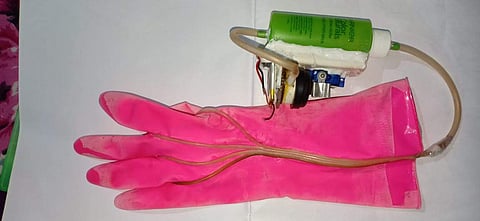

Doctors across the country have been raising concerns about the shortage of protective equipment amid the COVID-19 pandemic and to counter this, a 19-year-old student from a college in West Bengal has developed a low-cost, reusable glove that sprays sanitiser on to the surface of the hands automatically thus disinfecting the gloves from time to time.
Sankha Dey, who is pursuing his first year in Electronics and Communication Engineering from JIS College of Engineering, Kalyani in West Bengal, says, "Doctors are not getting proper protection while fighting on the frontlines against the Coronavirus. The gloves that they use are not reusable, they need to throw it after one use, however, even that is not possible due to the lack of protective resources for doctors. They also do not have time in between looking at patients or taking a sample to immediately change their gloves. As a result of this, they might get affected and the virus might spread too."
To counter this, he has created the Corona Gloves which uses an automatic alcohol sanitiser module that is attached to the gloves. Sanitiser flows out from time to time to disinfect the gloves' complete surface area and the other surfaces such as a syringe or saline bottle that a doctor keeps touching, in the meantime.
How does it work? For now, a small container is attached to the gloves with a pump attached on it and some pipes to reach the glove surface. The sanitiser is composed of 75 per cent ethyl alcohol and is present inside that container. As per the World Health Organisation guidelines for COVID-19, alcohol is a chemical that can destroy the novel Coronavirus by breaking their outer lipid-coating. The gloves are made taking this into consideration, adds Sankha. "This special pair of gloves is capable to wet its contact surface with ethyl alcohol, every 20 minutes. And the alcohol comes automatically from the embedded container," he explains.
The other elements used for the proper working of the gloves include:
- An Arduino Pro mini processor (for variable time interval system) - that controls the ejection of the sanitiser every 20 minute
- Specially designed pumping unit (for pumping purpose) - if a doctor puts his hands down so there might be possibilities that the sanitiser flows out or even goes in reverse when he puts his hands upward. So, the pump has been specially designed as a one-direction pump
- A micro servo motor (later Sankha will use a mini motor with gear support embedded with the pump to make it compact)
- 500 mah lipo battery (it can charge through a laptop or mobile USB hub or any 1 A mobile charger and it will run for 2 to 3 days after a full charge if the working time is 8 hour per day)
Currently, the total weight of the system is around 120 gm with 60 ml of alcohol. The 19-year-old made the device in just two to three days, "I began working on it from March 22, and made it completely at home. I got latex gloves from the chemistry lab, pipe from an old printer at home, the controller is at home anyway because I am an engineering student," he says. The gloves are the regular latex gloves but, he says, when they produce it in bulk he will use Nitrile gloves, which are said to be more suitable. "A 2011 research paper suggested that these gloves can be washed with Ethyl alcohol, however, the latex ones are incompatible. Another paper said the Nitrile gloves can take up to 83 per cent Ethyl alcohol and doesn't get damaged," Sankha explains.
Sankha has already received a $1000 grant from the Motwani Jadeja Foundation, which has been conducting the CODE19 hackathon online meant for coming up with solutions to help fight the pandemic. Sankha with the help of his professors at his college has also filed for a patent for his product. He and some of his other friends are also developing PPEs to help frontline health workers. "The current gloves device size is quite large and uncomfortable, we realise that but we are working on developing a more compact version like into a bracelet/wrist band model," he says.
He and his college mates are also working on two other devices — a Corona protective hat and a ring. "We are not allowed to touch the face or other parts of it so we are creating a ring for our fingers and a hat that will have a sensor to detect whenever the hand comes within a distance of 6 inches. And the sensor will alert the user," says Sankha. They are also working on a portable money disinfecting machine that can be used at ATMs or people can use it individually.
